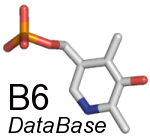|
|
| type |
Journal Article |
| authors |
Martino PD, Fursy R, Bret L, Sundararaju B, Phillips RS. |
| title |
Indole can act as an extracellular signal to regulate biofilm formation of Escherichia coli and other indole-producing bacteria |
| journal |
Can J Microbiol |
| Activity |
4.1.99.1 |
| sel |
selected |
| ui |
14569285 |
| year |
(2003) |
| volume |
49 |
| number |
7 |
| pages |
443-9 |
| | |
|---|
| keywords |
Ammonium Sulfate |
| abstract |
We demonstrated previously that genetic inactivation of tryptophanase is responsible for a dramatic decrease in biofilm formation in the laboratory strain Escherichia coli S17-1. In the present study, we tested whether the biochemical inhibition of tryptophanase, with the competitive inhibitor oxindolyl-L-alanine, could affect polystyrene colonization by E. coli and other indole-producing bacteria. Oxindolyl-L-alanine inhibits, in a dose-dependent manner, indole production and biofilm formation by strain S17-1 grown in Luria-Bertani (LB) medium. Supplementation with indole at physiologically relevant concentrations restores biofilm formation by strain S17-1 in the presence of oxindolyl-L-alanine and by mutant strain E. coli 3714 (S17-1 tnaA::Tn5) in LB medium. Oxindolyl-L-alanine also inhibits the adherence of S17-1 cells to polystyrene for a 3-h incubation time, but mutant strain 3714 cells are unaffected. At 0.5 mg/mL, oxindolyl-L-alanine exhibits inhibitory activity against biofilm formation in LB medium and in synthetic urine for several clinical isolates of E. coli, Klebsiella oxytoca, Citrobacter koseri, Providencia stuartii, and Morganella morganii but has no affect on indole-negative Klebsiella pneumoniae strains. In conclusion, these data suggest that indole, produced by the action of tryptophanase, is involved in polystyrene colonization by several indole-producing bacterial species. Indole may act as a signalling molecule to regulate the expression of adhesion and biofilm-promoting factors. |
| last changed |
2008/01/22 18:26 |
|











